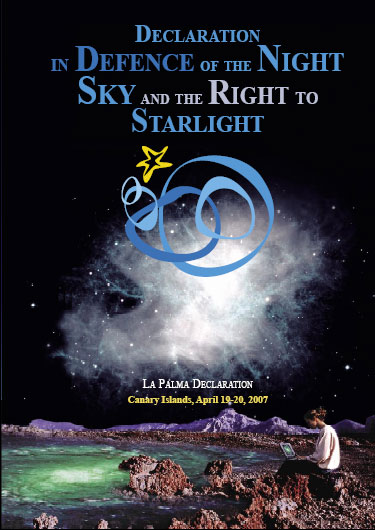Sitios de Excelencia - Visor GIS creado con ocasión del IYL2015
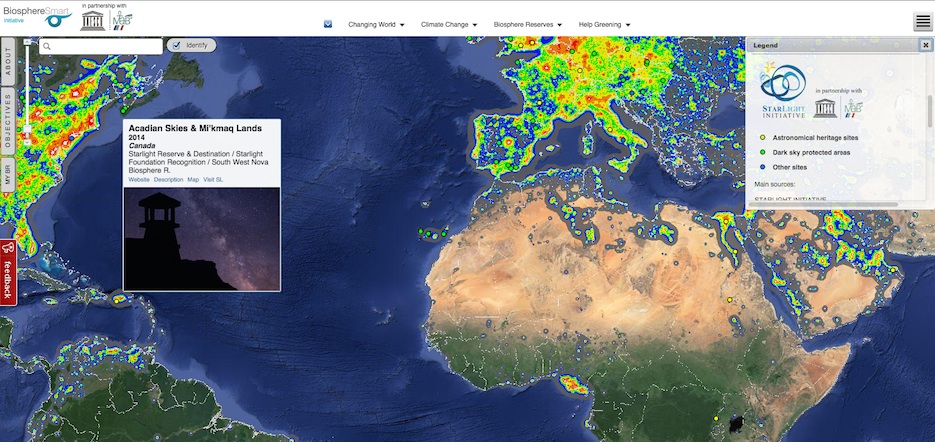
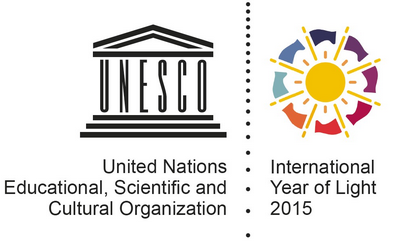
Mapa interactivo desarrollado por la Iniciativa Biosphere Smart en asociación con el Programa MaB de la UNESCO, con el apoyo de la Iniciativa Starlight e INTERRA. Esta acción se lanza con ocasión del Año Internacional de la Luz y las tecnologías basadas en la luz (IYL2015), con el eslogan "Hay otra manera de iluminar la noche".
La ventana inteligente de sitios de excelencia, alojada en la plataforma de la UNESCO Biosphere Smart, permite el acceso con un solo click a la información de los lugares más relevantes relacionados con el patrimonio de la astronomía, las área p`rotegidas que incorporan el cielo oscuro y otros lugares en el planeta comprometidos con la conservación del cielo nocturno y sus valores asociados. Incluye información sobre lugares y municipios que han adoptado regulación y ordenanzas avanzadas para combatir la contaminación lumínica. Se incluyen también más de veinte reservas de la biosfera que han desarrollado iniciativas de éxito para asegurar la calidad de sus cielos nocturnos y contribuir a la iluminación sostenible.
BiosphereSmart es el observatorio global de los sitios de la UNESCO creado para compartir conocimientos, buenas prácticas y experiencias entre las Reservas de la Biosfera y otros sitios de la UNESCO, en ámbitos como el cambio climático, las economías verdes y la innovación por el desarrollo sostenible.
![]() Acceso al visor SIG interactivo
Acceso al visor SIG interactivo
Principales fuentes y proyectos colaboradores
THE PORTAL TO THE HERITAGE OF ASTRONOMY
Integrated web portal for UNESCO’s Astronomy and World Heritage Initiative, supported by the International Working Group on Astronomy and World Heritage and by the International Astronomical Union through its Astronomy and World Heritage Working Group.
The Portal to the Heritage of Astronomy is a dynamic, publicly accessible database, discussion forum, and document-repository on astronomical heritage sites throughout the world, whether or not they are on UNESCO’s World Heritage List or national Tentative Lists. Serving UNESCO’s Astronomy and World Heritage Initiative, it suggests tools for the definition, identification, and assessment of the significance and, potentially, Outstanding Universal Value of this type of heritage. It also gives examples of the identification of such heritage together with information relevant to its protection, conservation, management and promotion.
![]() The Portal to Heritage of Astronomy
The Portal to Heritage of Astronomy
![]() Astronomical Heritage Finder
Astronomical Heritage Finder
WORLD LIST OF DARK SKY PROTECTED AREAS - IUCN Dark Skies Advisory Group (DSAG)
Established in 2009, the Group provides advice and guidance on behalf of the International Union for Conservation of Nature (IUCN) to other bodies in regards to light pollution and dark sky values, in particular as they relate to the ecological and commemorative integrity, visitor appreciation and public understanding of protected areas, and the long term maintenance of dark sky values for future generations.
![]() The web site of the IUCN Dark Skies Advisory Group
The web site of the IUCN Dark Skies Advisory Group
![]() World List of Dark Sky Protected Areas
World List of Dark Sky Protected Areas
STARPARKS - One Star at a Time Initiative
The "One Star at a Time" program is a worldwide effort to create accessible public spaces to view a starry night sky. A StarPark is a window to the firmament that each community voluntarily designates to enjoy the starry night sky. Its function is to claim and secure the right to starlight, especially for future generations..
![]() Global Starpark Network
Global Starpark Network
BIOSPHERESMART INITIATIVE
Biosphere Smart is a global observatory created to share ideas, knowledge, best-practices, and experiences among Biosphere Reserves on issues related to climate change, green economies, and sustainable development. The BiosphereSmart Initiative is based on the idea to maximise the use of new information technologies to build a covenant for a sustainable future and a transition to green societies based on knowledge. The BiosphereSmart platform is managed and operated by INTERRA.
![]() The BiosphereSmart Initiative
The BiosphereSmart Initiative
![]() BiosphereSmart Portal
BiosphereSmart Portal
There is another way to light up the night
"The intelligent use of artificial lighting that minimises sky glow and avoids obtrusive visual impact on both humans and wildlife has to be promoted. Public administrations, the lighting industry, and decisionmakers should also ensure that all users of artificial light do so responsibly as part of an integral part of planning and energy sustainability policies, which should be supported by light pollution measuring, both from the ground and from space. This strategy would involve a more efficient use of energy so as to meet the wider commitments made on climate change, and for the protection of the environment". Point 7 of DECLARATION IN DEFENCE OF THE NIGHT SKY AND THE RIGHT TO STARLIGHT (La Palma, 2007). Download
¿BUSCANDO ESTRELLAS?

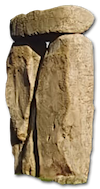
Entidad colaboradora del PORTAL DEL PATRIMONIO ASTRONÓMICO

Novedades
- Nueva publicación de la Iniciativa Starlight en asociación con UNESCO-MaB - Con el apoyo de iGuzzini
- El Parlamento de Galicia adopta la Declaración Starlight
- La Iniciativa Starlight en la 39ª Sesión del Comité del Patrimonio Mundial
- Declaración Internacional advierte sobre los riesgos de la luz blanca
- Nueva publicación de la Iniciativa Starlight en asociación con UNESCO-MaB
- El Patrimonio Astronómico - Hawaii 2015
- 2015 Año Internacional de la Luz y del diseño de iluminación
- Montsec - Destino y Reserva Starlight
Buscador Starlight
Sitios relacionados con la Iniciativa Starlight
![]()
Iniciativa Relacionada del Pacto de Alcaldes
![]()
Asociada al Grupo de Trabajo UAI
![]()
Grupo asesor de cielos oscuros IUCN
![]()
Proyecto DSA
![]()
Iniciativa asociada a UNESCO-MaB
![]()
Miembro de la Red de Conocimiento
![]()
Instituto de Astrofísica de Canarias
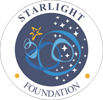 |
La Iniciativa Starlight (La Luz de las Estrellas) se concibe como una acción internacional en defensa de la calidad de los cielos nocturnos y el derecho general a la observación de la estrellas, abierta a la participación de todas las instituciones y asociaciones científicas, culturales y ciudadanas relacionadas con la defensa del firmamento... |
Iniciativa asociada a: |
|
|
